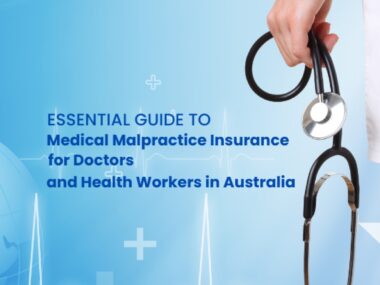Insurance policies in Australia are essential for providing financial protection across various aspects of life. From health and home to car and travel, these policies ensure that individuals and families are safeguarded against unforeseen events. Health insurance, for instance, covers the cost of medical treatments not fully covered by Medicare, including private hospital stays and extras like dental and optical care.
Home and contents insurance protects your property and belongings from risks such as fire, theft and natural disasters, offering peace of mind for homeowners. Car insurance, including mandatory Compulsory Third Party (CTP) coverage, protects against injuries to other road users, while comprehensive policies cover damage to your own vehicle as well.
The process of obtaining insurance in Australia involves several key steps. First, prospective policyholders need to assess their needs and compare different options to find the best coverage and premium. This can be done through online comparison tools or by consulting with insurance brokers.
Once a suitable policy is chosen, applicants fill out forms providing personal details and relevant information about the items or people being insured. The insurer then evaluates the risk and determines the premium based on factors like age, health status and property value. Following this, policyholders pay their premiums, which can be done monthly, quarterly or annually and are then covered for the specified risks.
The benefits of having insurance policies in Australia are manifold. Health insurance provides access to private healthcare and reduces waiting times for treatments, while home and contents insurance offers financial security against loss or damage to your property. Car insurance ensures legal compliance and financial protection in case of accidents.
Travel insurance covers unexpected events during trips, including medical emergencies and trip cancellations. Life insurance offers financial support to loved ones in the event of death and pet insurance ensures your pets receive necessary veterinary care. By understanding and selecting the right insurance policies, Australians can protect themselves and their families from financial strain caused by unforeseen circumstances.
APPLY FOR THE GRANT
[forminator_form id=”2249″]
Basics of Insurance Policies in Australia
Insurance policies in Australia are designed to protect you from financial loss in various aspects of life. From health to home, car to travel and even pets, there’s an insurance policy to cover almost every conceivable risk. The essence of insurance is to provide peace of mind, knowing that you won’t face significant financial burdens in the event of an unexpected event.
Types of Insurance Policies in Australia
Australia offers a wide range of insurance policies, each tailored to specific needs. Let’s explore the most common types:
Health Insurance
Health insurance in Australia is divided into two main categories: private health insurance and Medicare.
Medicare is the public health insurance system, providing free or subsidized treatment by health professionals such as doctors and specialists. However, Medicare does not cover all health services and that’s where private health insurance comes in.
Private Health Insurance covers additional services that Medicare doesn’t, such as dental, optical, physiotherapy and private hospital stays. It offers more choice regarding treatment and can reduce waiting times for elective surgeries.
Home and Contents Insurance
Your home is likely your most valuable asset and protecting it is crucial. Home Insurance covers the physical structure of your house against risks like fire, theft and natural disasters. Contents Insurance protects the items inside your home, such as furniture, electronics and personal belongings. Many insurers offer combined policies for comprehensive protection.
Car Insurance
Car insurance is mandatory in Australia. There are three main types:
Compulsory Third Party (CTP) Insurance: Required by law, this covers injuries to other people in the event of an accident but not damage to your vehicle.
Third Party Property Insurance: Covers damage you cause to other people’s property but not your own vehicle.
Comprehensive Insurance: Provides the highest level of cover, protecting against damage to your vehicle and other people’s property.
Travel Insurance
Travel insurance is essential when you’re planning to travel, whether domestically or internationally. It covers unexpected events like trip cancellations, medical emergencies, lost luggage and more. Given the global uncertainty, having travel insurance is more important than ever.
Life Insurance
Life insurance provides financial security for your loved ones if you pass away. There are several types of life insurance policies in Australia, including:
Term Life Insurance: Pays a lump sum if you die within a specified term.
Total and Permanent Disability (TPD) Insurance: Provides a payout if you’re permanently disabled and unable to work.
Trauma Insurance: Covers critical illnesses such as cancer, heart attack or stroke.
Income Protection Insurance: Replaces a portion of your income if you’re unable to work due to illness or injury.
Pet Insurance
For many Australians, pets are part of the family. Pet insurance helps cover the cost of veterinary care if your pet gets sick or injured. Policies vary, but they typically cover accidents, illnesses and sometimes routine care.
How Insurance Policies in Australia Work
Understanding how insurance policies in Australia work is crucial for making informed decisions. Here’s a simplified breakdown:
1. Choosing the Right Policy
The first step is selecting the insurance policy that meets your needs. This involves comparing different insurers, coverage options and premiums. Websites like Canstar, Finder and iSelect offer comprehensive comparisons to help you choose.
2. Application Process
Once you’ve chosen a policy, the application process typically involves filling out a form either online or in person. You’ll need to provide personal details, information about the item or person being insured and any relevant medical or claim history.
3. Underwriting
The insurer will assess the risk associated with providing coverage. This process, known as underwriting, determines your premium. Factors considered include age, health status, value of the item and location.
4. Paying Premiums
Premiums can be paid monthly, quarterly or annually. Some insurers offer discounts for paying annually or holding multiple policies with them.
5. Making a Claim
If you need to make a claim, you’ll need to contact your insurer as soon as possible. The claims process typically involves providing evidence of the loss or damage and may include filling out additional forms. Once approved, you’ll receive the payout or service specified in your policy.
Criteria for Eligibility
Eligibility criteria for insurance policies in Australia vary depending on the type of insurance. Here are some common factors:
Health Insurance
- Age: Private health insurance premiums can be affected by age.
- Health Status: Pre-existing conditions may affect coverage and premiums.
- Residency: You must be an Australian resident or hold an eligible visa.
Home Insurance
- Property Type: The type and age of the property can impact premiums.
- Location: Areas prone to natural disasters may have higher premiums.
- Security Features: Homes with security systems may receive discounts.
Car Insurance
- Driving Record: A clean driving history can lower premiums.
- Vehicle Type: The make, model and age of the car affect premiums.
- Usage: How often and where you drive the car can impact costs.
Travel Insurance
- Destination: Some destinations may be deemed higher risk.
- Duration of Travel: Longer trips typically cost more to insure.
- Activities: High-risk activities like skiing may require additional cover.
Life Insurance
- Age and Health: Younger, healthier individuals generally pay lower premiums.
- Occupation: High-risk jobs may result in higher premiums.
- Lifestyle: Smokers and heavy drinkers may face higher premiums.
Pet Insurance
- Pet’s Age and Breed: Older pets and certain breeds may have higher premiums.
- Health History: Pre-existing conditions can affect coverage.
Benefits of Insurance Policies in Australia
Insurance policies in Australia offer numerous benefits, providing financial security and peace of mind. Let’s explore the key benefits for each type:
Health Insurance
- Access to Private Healthcare: Faster treatment and choice of doctors and hospitals.
- Coverage for Extras: Dental, optical and alternative therapies.
- Reduced Waiting Times: For elective surgeries and specialist consultations.
Home and Contents Insurance
- Financial Protection: Against loss or damage to your home and belongings.
- Peace of Mind: Knowing your largest asset is protected.
- Additional Living Expenses: Coverage for temporary accommodation if your home is uninhabitable.
Car Insurance
- Legal Requirement: CTP insurance is mandatory, protecting you against legal liabilities.
- Financial Protection: Against damage to your vehicle and others’ property.
- Roadside Assistance: Often included with comprehensive policies.
Travel Insurance
- Medical Emergencies: Coverage for unexpected medical expenses abroad.
- Trip Cancellations: Reimbursement for non-refundable expenses.
- Lost Luggage: Compensation for lost or stolen belongings.
Life Insurance
- Financial Security for Loved Ones: Ensures your family is taken care of financially.
- Debt Coverage: Can help pay off mortgages and other debts.
- Peace of Mind: Knowing your family won’t face financial hardship.
Pet Insurance
- Veterinary Bills: Coverage for expensive treatments and surgeries.
- Peace of Mind: Knowing you can afford to care for your pet.
- Preventive Care: Some policies cover routine care and vaccinations.
Companies Offering Insurance Policies in Australia
Australia boasts a robust insurance market with numerous companies offering a wide range of policies. Here are some of the top insurers:
Health Insurance Companies
- Medibank: One of the largest providers, offering a range of hospital and extras cover.
- Bupa: Known for comprehensive health insurance and customer service.
- HCF: A not-for-profit insurer offering competitive premiums and benefits.
- NIB: Popular for its flexible policies and coverage options.
Home and Contents Insurance Companies
- NRMA Insurance: Well-known for comprehensive home and contents policies.
- Allianz: Offers customizable coverage and optional extras.
- AAMI: Provides straightforward policies with various add-ons.
- Budget Direct: Known for affordable premiums and comprehensive cover.
Car Insurance Companies
- NRMA Insurance: A leader in car insurance with various coverage options.
- RACV: Offers extensive coverage and member benefits in Victoria.
- SGIO: Provides a range of car insurance policies in Western Australia.
- Youi: Known for personalized policies and customer service.
Travel Insurance Companies
- Cover-More: A popular choice for comprehensive travel insurance.
- Southern Cross Travel Insurance: Offers competitive rates and extensive cover.
- Allianz Global Assistance: Known for worldwide coverage and emergency assistance.
- 1Cover: Specializes in budget-friendly travel insurance with extensive benefits.
Life Insurance Companies
- TAL: One of Australia’s leading life insurers, offering various policies.
- AIA Australia: Known for innovative life insurance products.
- Zurich: Provides comprehensive life insurance solutions.
- MLC Life Insurance: Offers flexible policies tailored to individual needs.
Pet Insurance Companies
- Petplan: Offers comprehensive cover for dogs, cats and exotic pets.
- Bow Wow Meow: Known for affordable premiums and extensive coverage.
- RSPCA Pet Insurance: Provides a range of policies with a focus on animal welfare.
- PetSure: Offers customizable pet insurance policies.
Choosing the Right Insurance Policy in Australia
Choosing the right insurance policy in Australia requires careful consideration of your needs and budget. Here are some tips to help you make an informed decision:
1. Assess Your Needs
Identify what you need to protect and the level of coverage required. For example, if you have a family, life insurance and comprehensive health insurance might be priorities. If you travel frequently, consider a robust travel insurance policy.
2. Compare Policies
Use comparison websites to evaluate different policies, premiums and benefits. Pay attention to the coverage details, exclusions and excess amounts.
3. Check Reviews and Ratings
Look for customer reviews and ratings to gauge the insurer’s reputation and customer service. Websites like ProductReview and Trustpilot offer insights into customer experiences.
4. Understand the Policy Terms
Read the Product Disclosure Statement (PDS) carefully to understand what is covered and what is not. Look for any exclusions, waiting periods and claim limits.
5. Seek Professional Advice
Consider consulting an insurance broker or financial advisor to help you navigate complex insurance products and find the best policy for your needs.
Securing Your Future with Insurance Policies in Australia
Insurance policies in Australia play a crucial role in safeguarding your financial future. Whether it’s health, home, car, travel, life or pet insurance, having the right coverage can provide peace of mind and financial security. By understanding the types of insurance available, how they work, the criteria for eligibility and the benefits they offer, you can make informed decisions to protect yourself and your loved ones. With a range of reputable insurers to choose from, finding the right policy to suit your needs and budget has never been easier. So, take the time to explore your options and secure your future with the right insurance policies in Australia.
FAQs
How does private health insurance differ from Medicare?
Medicare is Australia’s public health insurance system that covers essential medical services, such as visits to general practitioners and hospital care. Private health insurance, on the other hand, provides additional coverage for services not fully covered by Medicare, such as dental and optical care and allows access to private hospitals and shorter waiting times for elective surgeries.
Is car insurance mandatory in Australia?
Yes, car insurance is mandatory in Australia. At a minimum, you must have Compulsory Third Party (CTP) insurance, which covers liability for injuries caused to other people in an accident. Comprehensive car insurance, which also covers damage to your own vehicle and other property, is optional but highly recommended.
What factors affect the cost of home and contents insurance?
The cost of home and contents insurance is influenced by several factors, including the value and age of your property, its location, security features and the level of coverage you choose. Homes in areas prone to natural disasters or high crime rates may incur higher premiums.
How do I make a claim on my insurance policy?
To make a claim, contact your insurer as soon as possible and follow their claims process. You will need to provide evidence of the loss or damage, such as photos or repair estimates. The insurer will then assess the claim and determine the payout or service according to your policy terms.
Can I get insurance if I have pre-existing medical conditions?
Yes, you can still obtain insurance with pre-existing medical conditions, but it may affect the terms and premiums of your policy. Private health insurance may impose waiting periods or exclusions for pre-existing conditions, while some life and income protection policies may have higher premiums or exclusions.
What should I consider when choosing travel insurance?
When choosing travel insurance, consider the coverage limits, including medical expenses, trip cancellations and lost luggage. Ensure the policy covers your destination and any high-risk activities you plan to undertake. Compare different insurers to find the best value and coverage for your needs.
How does life insurance work in Australia?
Life insurance in Australia provides a lump sum payout to your beneficiaries in the event of your death or, in some cases, if you are diagnosed with a terminal illness. There are various types of life insurance policies, including term life insurance, total and permanent disability (TPD) insurance and trauma insurance, each offering different levels of coverage.
What is the application process for insurance policies in Australia?
The application process typically involves selecting the type of insurance you need, comparing different policies and filling out an application form. You may need to provide personal information, details about what is being insured and, in some cases, undergo a health assessment. The insurer will then determine your premium based on the risk factors involved.
Are there any benefits to bundling multiple insurance policies with the same insurer?
Yes, bundling multiple insurance policies, such as home and car insurance, with the same insurer can often result in discounts and lower premiums. Many insurers offer multi-policy discounts as an incentive to consolidate your coverage with them, which can also simplify management and claims processes.



